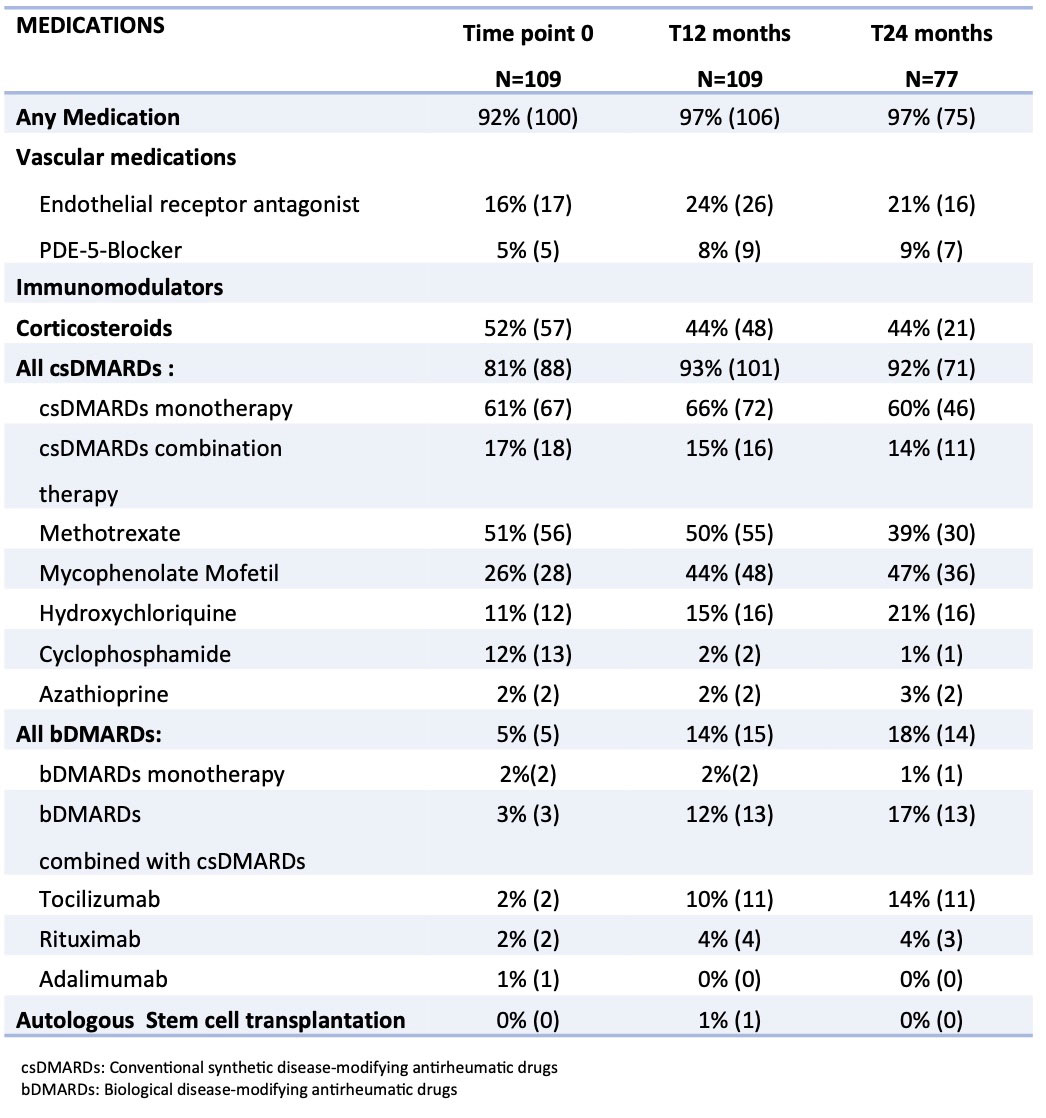Session Information
Date: Saturday, November 12, 2022
Title: Abstracts: Pediatric Rheumatology – Clinical I: Connective Tissue Disease
Session Type: Abstract Session
Session Time: 3:00PM-4:30PM
Background/Purpose: Juvenile systemic scleroderma (jSSc) is an orphan disease with a prevalence of 3 in 1,000,000 children. Currently no medications are licensed for the treatment of jSSc. Due to its rarity, only recently have the first management and treatment guidelines been published, the jSSc SHARE (Single Hub and Access point for paediatric Rheumatology in Europe) recommendations, reflecting consensus opinion upon pediatric rheumatologists (1).
Methods: The juvenile systemic sclerosis inceptions cohort (jSScC) is a multinational cohort that prospectively collects clinical data, including medications at baseline and subsequent visits. The jSScC enrollment criteria include age of onset of the first non-Raynaud symptom younger than 16 years and age younger than 18 years at cohort entrance. The frequency of medications (general category and specific medication) was calculated across the cohort at timepoint 0 (enrollment), 12 months and 24 months.
Results: We extracted data from the jSScC of patients who were followed for 12 or 24 months. One-hundred and nine patients were followed at time point 0 (T0) and 12 months (T12), and data was available for 77 of them up at 24 months (T24). The mean age of the patients was 13.2 years at the timepoint 0. Three-quarters were female and 75 % had diffuse subtype. Disease duration at baseline visit was 3.1 years. The medications the patients were on recorded by the physician were captured at T0, T12 and T24 listed in Table 1.
Conclusion: At baseline half of the patients were on corticosteroids. This is more frequent than typical adult SSc practice but coincides with jSSc SHARE treatment recommendations (#1)(1). After 12 months observation in the cohort over 90% of patients received a DMARD therapy. Methotrexate and mycophenolate mofetil were the most commonly prescribed DMARDs, which also reflects the SHARE treatment recommendations (#2 and #3). At 12 months the use of glucocorticoid decreased and the use of bDMARDs increased. In general, biological DMARDs are typically considered in severe or refractory (SHARE recommendation #7), reflecting the lower percentage compared to csDMARDs. Autologous stem cell transplantation was observed in one patient at 12 months, reflecting an option in jSSc with progressive and refractory disease (SHARE recommendation #8). Endothelial receptor antagonists, such as bosentan, were used over time in approximately 20% of the patients, reflecting SHARE recommendation #6 for pulmonary hypertension and/or digital tip ulcers. This is the first evaluation looking at clinical medication practice pattern in jSSc, and its comparison to recently published consensus guidelines.
References:
1. Foeldvari I, Culpo R, Sperotto F, Anton J, Avcin T, Baildam E, et al. Consensus-based recommendations for the management of juvenile systemic sclerosis. Rheumatology (Oxford). 2021;60(4):1651-8.
This project was supported by an unrestricted grant from “Joachim Herz Stiftung”
To cite this abstract in AMA style:
Foeldvari I, Klotsche J, Kasapcopur O, Adrovic A, Torok K, Terreri M, Sakamoto A, Feldman B, Anton J, SZTAJNBOK F, Stanevica V, Appenzeller S, Avcin T, Johnson S, Khubchandani R, Kostik M, Marrani E, Sifuentes-Giraldo W, Nemcova D, Santos M, Schonenberg-Meinema D, Battagliotti C, Berntson L, Bica B, Brunner J, Cimaz R, Eleftheriou D, Harel L, Horneff G, Janarthanan M, Kallinich T, Lehman T, Nuruzzaman F, Patwardhan A, Smith V, Helmus N. Juvenile Systemic Sclerosis Treatment Practices in an International Cohort and Comparison to Recent SHARE Consensus Guidelines [abstract]. Arthritis Rheumatol. 2022; 74 (suppl 9). https://acrabstracts.org/abstract/juvenile-systemic-sclerosis-treatment-practices-in-an-international-cohort-and-comparison-to-recent-share-consensus-guidelines/. Accessed .« Back to ACR Convergence 2022
ACR Meeting Abstracts - https://acrabstracts.org/abstract/juvenile-systemic-sclerosis-treatment-practices-in-an-international-cohort-and-comparison-to-recent-share-consensus-guidelines/

